Exploring Occupational Therapist’s Perceptive For Implementing Family Cantered Practice In Saudi Arabia: Qualitative Study
VerifiedAdded on 2023/06/06
|10
|2866
|384
AI Summary
This qualitative study explores the occupational therapist’s perspective for implementing family-centered practice in Saudi Arabia. It discusses the relevance of family-centered practice, its importance to occupational therapists, barriers between therapists and families, and literature review on family-centered care.
Contribute Materials
Your contribution can guide someone’s learning journey. Share your
documents today.
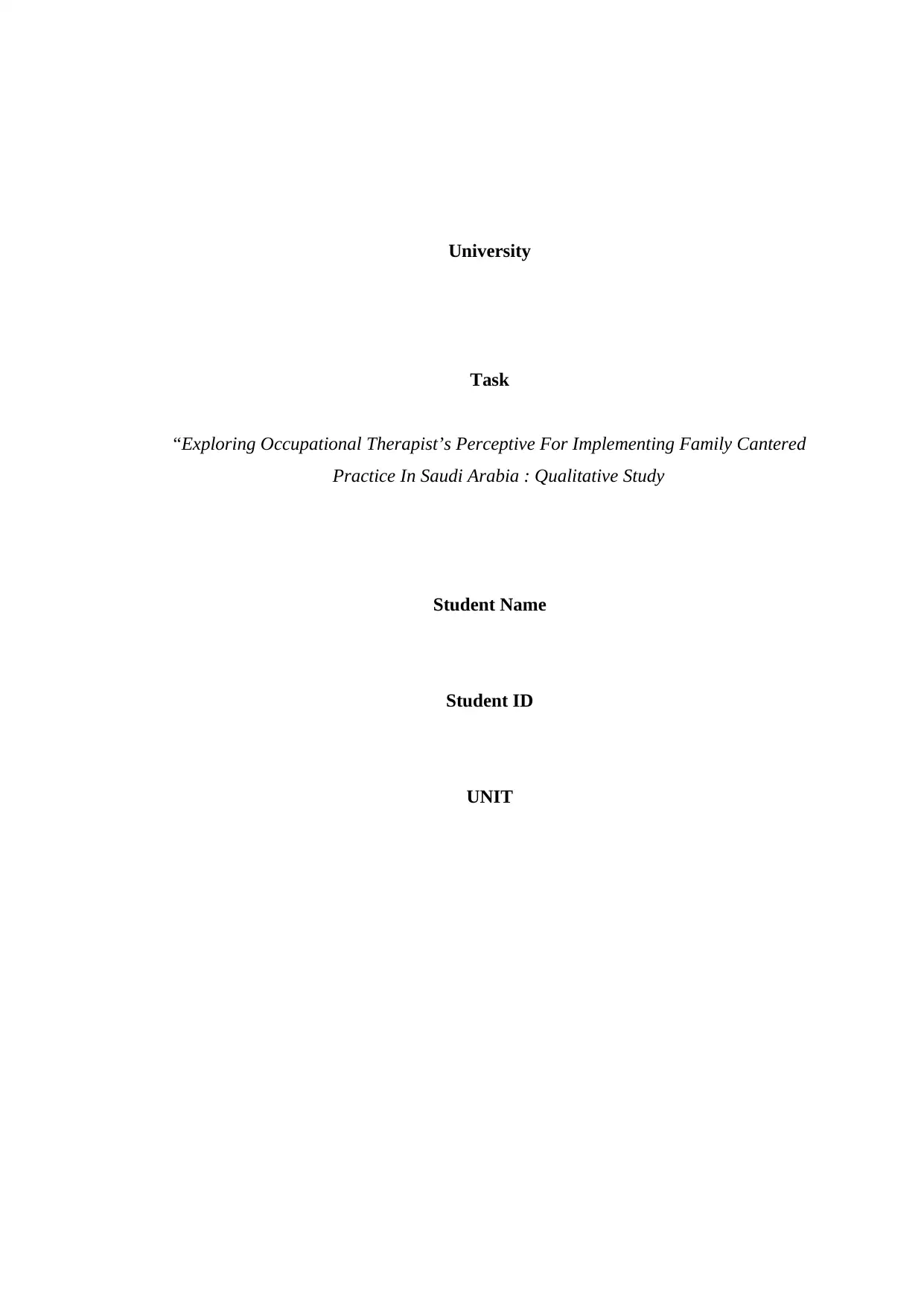
University
Task
“Exploring Occupational Therapist’s Perceptive For Implementing Family Cantered
Practice In Saudi Arabia : Qualitative Study
Student Name
Student ID
UNIT
Task
“Exploring Occupational Therapist’s Perceptive For Implementing Family Cantered
Practice In Saudi Arabia : Qualitative Study
Student Name
Student ID
UNIT
Secure Best Marks with AI Grader
Need help grading? Try our AI Grader for instant feedback on your assignments.
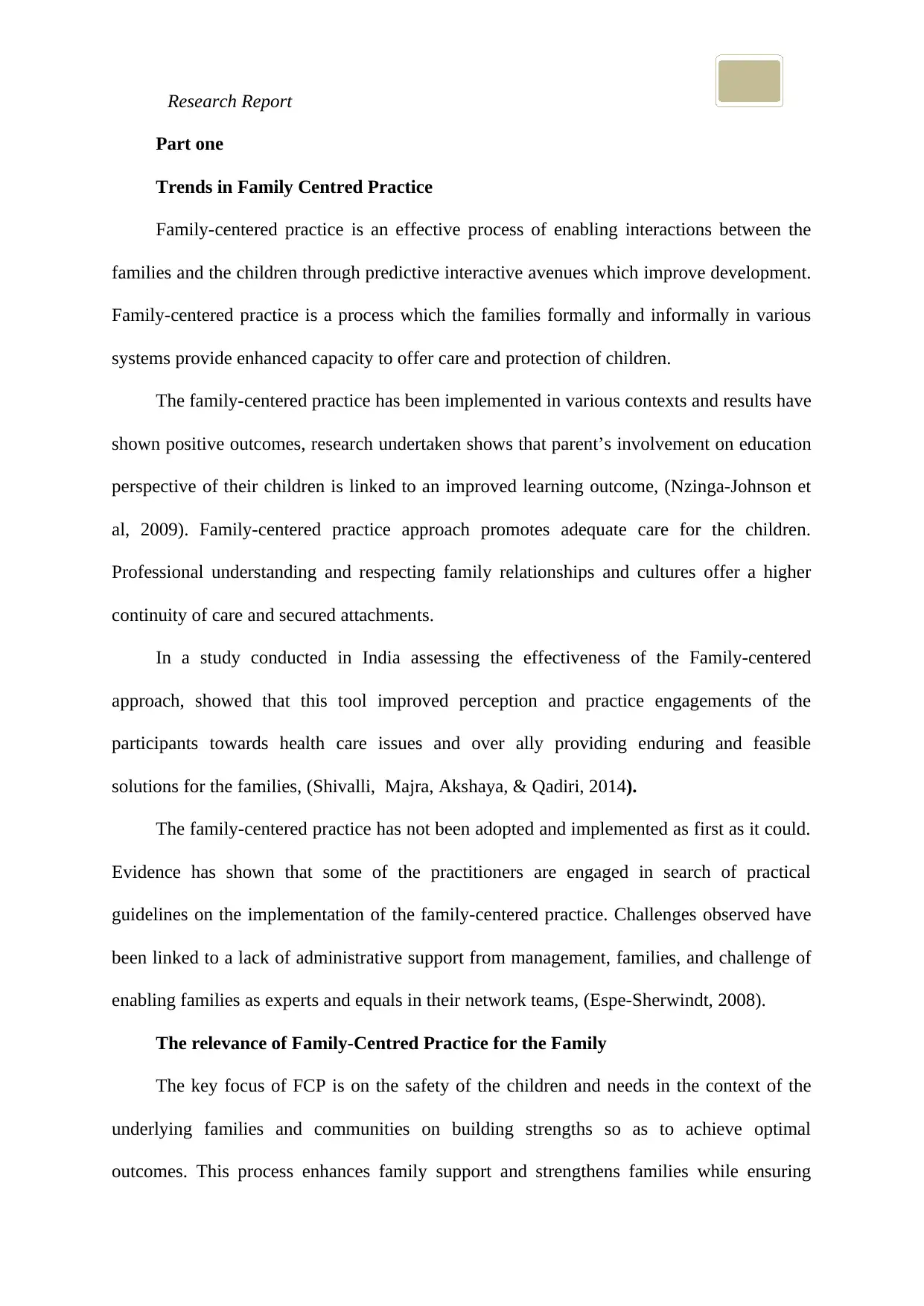
2
Research Report
Part one
Trends in Family Centred Practice
Family-centered practice is an effective process of enabling interactions between the
families and the children through predictive interactive avenues which improve development.
Family-centered practice is a process which the families formally and informally in various
systems provide enhanced capacity to offer care and protection of children.
The family-centered practice has been implemented in various contexts and results have
shown positive outcomes, research undertaken shows that parent’s involvement on education
perspective of their children is linked to an improved learning outcome, (Nzinga-Johnson et
al, 2009). Family-centered practice approach promotes adequate care for the children.
Professional understanding and respecting family relationships and cultures offer a higher
continuity of care and secured attachments.
In a study conducted in India assessing the effectiveness of the Family-centered
approach, showed that this tool improved perception and practice engagements of the
participants towards health care issues and over ally providing enduring and feasible
solutions for the families, (Shivalli, Majra, Akshaya, & Qadiri, 2014).
The family-centered practice has not been adopted and implemented as first as it could.
Evidence has shown that some of the practitioners are engaged in search of practical
guidelines on the implementation of the family-centered practice. Challenges observed have
been linked to a lack of administrative support from management, families, and challenge of
enabling families as experts and equals in their network teams, (Espe-Sherwindt, 2008).
The relevance of Family-Centred Practice for the Family
The key focus of FCP is on the safety of the children and needs in the context of the
underlying families and communities on building strengths so as to achieve optimal
outcomes. This process enhances family support and strengthens families while ensuring
Research Report
Part one
Trends in Family Centred Practice
Family-centered practice is an effective process of enabling interactions between the
families and the children through predictive interactive avenues which improve development.
Family-centered practice is a process which the families formally and informally in various
systems provide enhanced capacity to offer care and protection of children.
The family-centered practice has been implemented in various contexts and results have
shown positive outcomes, research undertaken shows that parent’s involvement on education
perspective of their children is linked to an improved learning outcome, (Nzinga-Johnson et
al, 2009). Family-centered practice approach promotes adequate care for the children.
Professional understanding and respecting family relationships and cultures offer a higher
continuity of care and secured attachments.
In a study conducted in India assessing the effectiveness of the Family-centered
approach, showed that this tool improved perception and practice engagements of the
participants towards health care issues and over ally providing enduring and feasible
solutions for the families, (Shivalli, Majra, Akshaya, & Qadiri, 2014).
The family-centered practice has not been adopted and implemented as first as it could.
Evidence has shown that some of the practitioners are engaged in search of practical
guidelines on the implementation of the family-centered practice. Challenges observed have
been linked to a lack of administrative support from management, families, and challenge of
enabling families as experts and equals in their network teams, (Espe-Sherwindt, 2008).
The relevance of Family-Centred Practice for the Family
The key focus of FCP is on the safety of the children and needs in the context of the
underlying families and communities on building strengths so as to achieve optimal
outcomes. This process enhances family support and strengthens families while ensuring
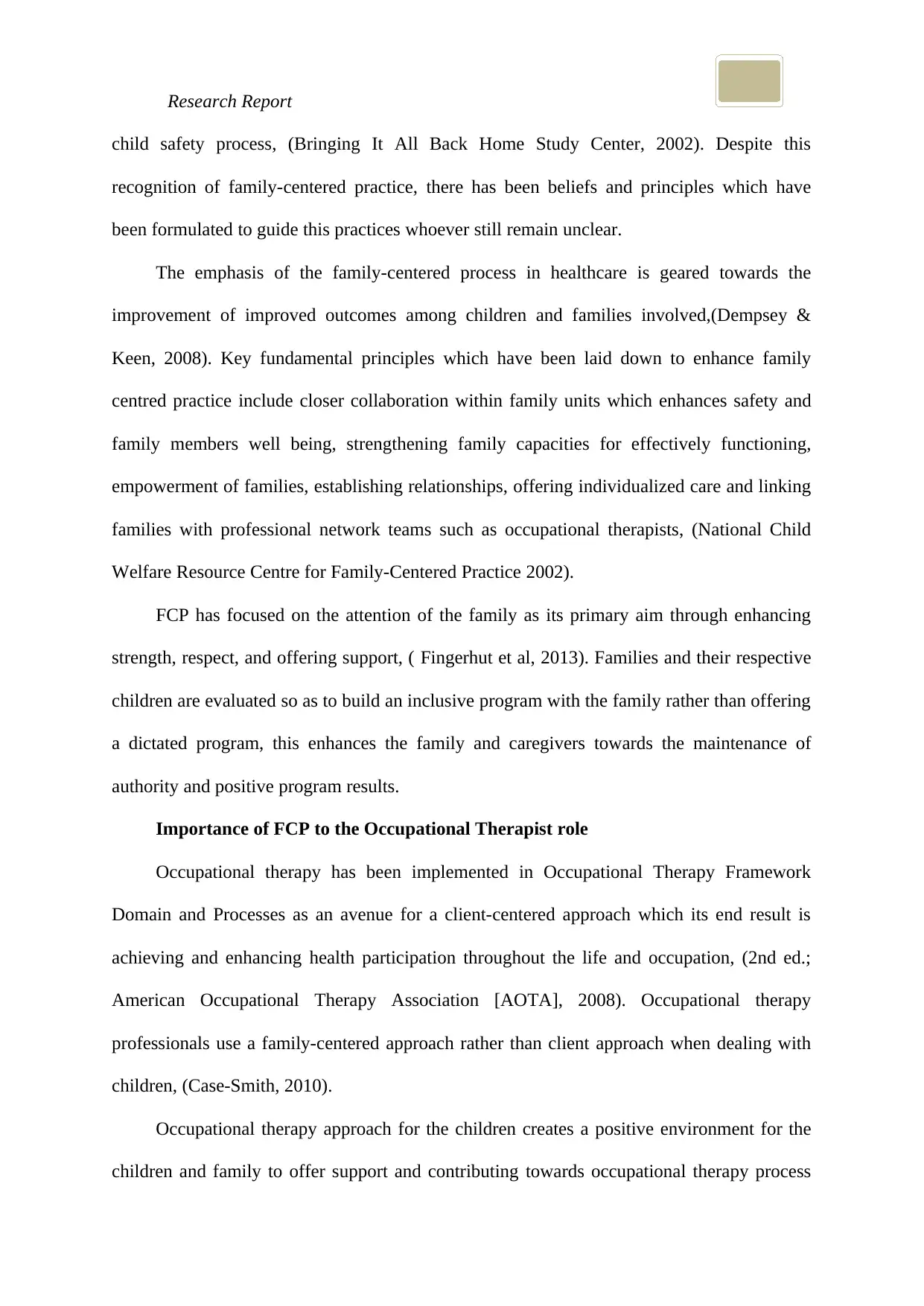
2
Research Report
child safety process, (Bringing It All Back Home Study Center, 2002). Despite this
recognition of family-centered practice, there has been beliefs and principles which have
been formulated to guide this practices whoever still remain unclear.
The emphasis of the family-centered process in healthcare is geared towards the
improvement of improved outcomes among children and families involved,(Dempsey &
Keen, 2008). Key fundamental principles which have been laid down to enhance family
centred practice include closer collaboration within family units which enhances safety and
family members well being, strengthening family capacities for effectively functioning,
empowerment of families, establishing relationships, offering individualized care and linking
families with professional network teams such as occupational therapists, (National Child
Welfare Resource Centre for Family-Centered Practice 2002).
FCP has focused on the attention of the family as its primary aim through enhancing
strength, respect, and offering support, ( Fingerhut et al, 2013). Families and their respective
children are evaluated so as to build an inclusive program with the family rather than offering
a dictated program, this enhances the family and caregivers towards the maintenance of
authority and positive program results.
Importance of FCP to the Occupational Therapist role
Occupational therapy has been implemented in Occupational Therapy Framework
Domain and Processes as an avenue for a client-centered approach which its end result is
achieving and enhancing health participation throughout the life and occupation, (2nd ed.;
American Occupational Therapy Association [AOTA], 2008). Occupational therapy
professionals use a family-centered approach rather than client approach when dealing with
children, (Case-Smith, 2010).
Occupational therapy approach for the children creates a positive environment for the
children and family to offer support and contributing towards occupational therapy process
Research Report
child safety process, (Bringing It All Back Home Study Center, 2002). Despite this
recognition of family-centered practice, there has been beliefs and principles which have
been formulated to guide this practices whoever still remain unclear.
The emphasis of the family-centered process in healthcare is geared towards the
improvement of improved outcomes among children and families involved,(Dempsey &
Keen, 2008). Key fundamental principles which have been laid down to enhance family
centred practice include closer collaboration within family units which enhances safety and
family members well being, strengthening family capacities for effectively functioning,
empowerment of families, establishing relationships, offering individualized care and linking
families with professional network teams such as occupational therapists, (National Child
Welfare Resource Centre for Family-Centered Practice 2002).
FCP has focused on the attention of the family as its primary aim through enhancing
strength, respect, and offering support, ( Fingerhut et al, 2013). Families and their respective
children are evaluated so as to build an inclusive program with the family rather than offering
a dictated program, this enhances the family and caregivers towards the maintenance of
authority and positive program results.
Importance of FCP to the Occupational Therapist role
Occupational therapy has been implemented in Occupational Therapy Framework
Domain and Processes as an avenue for a client-centered approach which its end result is
achieving and enhancing health participation throughout the life and occupation, (2nd ed.;
American Occupational Therapy Association [AOTA], 2008). Occupational therapy
professionals use a family-centered approach rather than client approach when dealing with
children, (Case-Smith, 2010).
Occupational therapy approach for the children creates a positive environment for the
children and family to offer support and contributing towards occupational therapy process
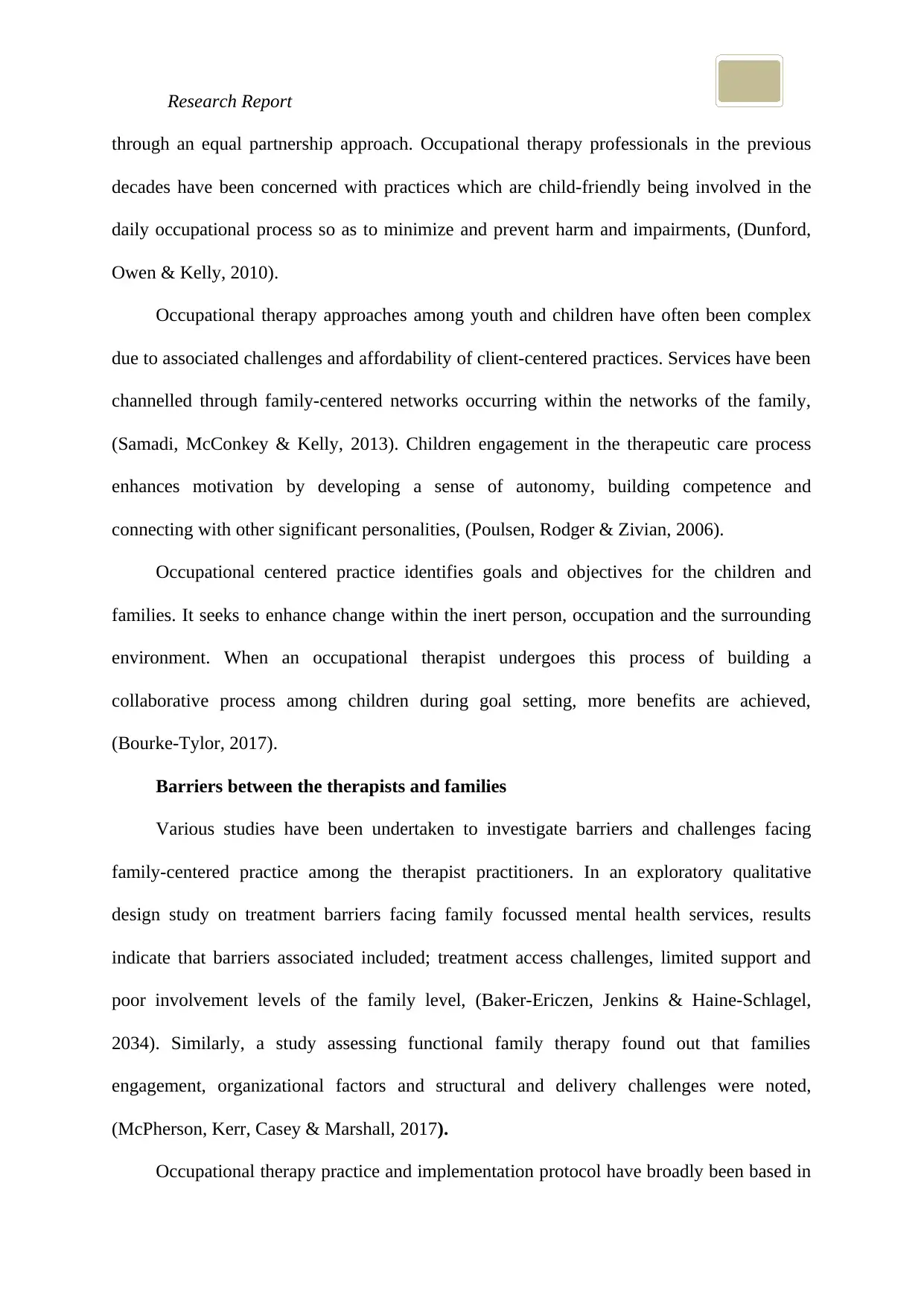
2
Research Report
through an equal partnership approach. Occupational therapy professionals in the previous
decades have been concerned with practices which are child-friendly being involved in the
daily occupational process so as to minimize and prevent harm and impairments, (Dunford,
Owen & Kelly, 2010).
Occupational therapy approaches among youth and children have often been complex
due to associated challenges and affordability of client-centered practices. Services have been
channelled through family-centered networks occurring within the networks of the family,
(Samadi, McConkey & Kelly, 2013). Children engagement in the therapeutic care process
enhances motivation by developing a sense of autonomy, building competence and
connecting with other significant personalities, (Poulsen, Rodger & Zivian, 2006).
Occupational centered practice identifies goals and objectives for the children and
families. It seeks to enhance change within the inert person, occupation and the surrounding
environment. When an occupational therapist undergoes this process of building a
collaborative process among children during goal setting, more benefits are achieved,
(Bourke-Tylor, 2017).
Barriers between the therapists and families
Various studies have been undertaken to investigate barriers and challenges facing
family-centered practice among the therapist practitioners. In an exploratory qualitative
design study on treatment barriers facing family focussed mental health services, results
indicate that barriers associated included; treatment access challenges, limited support and
poor involvement levels of the family level, (Baker-Ericzen, Jenkins & Haine-Schlagel,
2034). Similarly, a study assessing functional family therapy found out that families
engagement, organizational factors and structural and delivery challenges were noted,
(McPherson, Kerr, Casey & Marshall, 2017).
Occupational therapy practice and implementation protocol have broadly been based in
Research Report
through an equal partnership approach. Occupational therapy professionals in the previous
decades have been concerned with practices which are child-friendly being involved in the
daily occupational process so as to minimize and prevent harm and impairments, (Dunford,
Owen & Kelly, 2010).
Occupational therapy approaches among youth and children have often been complex
due to associated challenges and affordability of client-centered practices. Services have been
channelled through family-centered networks occurring within the networks of the family,
(Samadi, McConkey & Kelly, 2013). Children engagement in the therapeutic care process
enhances motivation by developing a sense of autonomy, building competence and
connecting with other significant personalities, (Poulsen, Rodger & Zivian, 2006).
Occupational centered practice identifies goals and objectives for the children and
families. It seeks to enhance change within the inert person, occupation and the surrounding
environment. When an occupational therapist undergoes this process of building a
collaborative process among children during goal setting, more benefits are achieved,
(Bourke-Tylor, 2017).
Barriers between the therapists and families
Various studies have been undertaken to investigate barriers and challenges facing
family-centered practice among the therapist practitioners. In an exploratory qualitative
design study on treatment barriers facing family focussed mental health services, results
indicate that barriers associated included; treatment access challenges, limited support and
poor involvement levels of the family level, (Baker-Ericzen, Jenkins & Haine-Schlagel,
2034). Similarly, a study assessing functional family therapy found out that families
engagement, organizational factors and structural and delivery challenges were noted,
(McPherson, Kerr, Casey & Marshall, 2017).
Occupational therapy practice and implementation protocol have broadly been based in
Secure Best Marks with AI Grader
Need help grading? Try our AI Grader for instant feedback on your assignments.
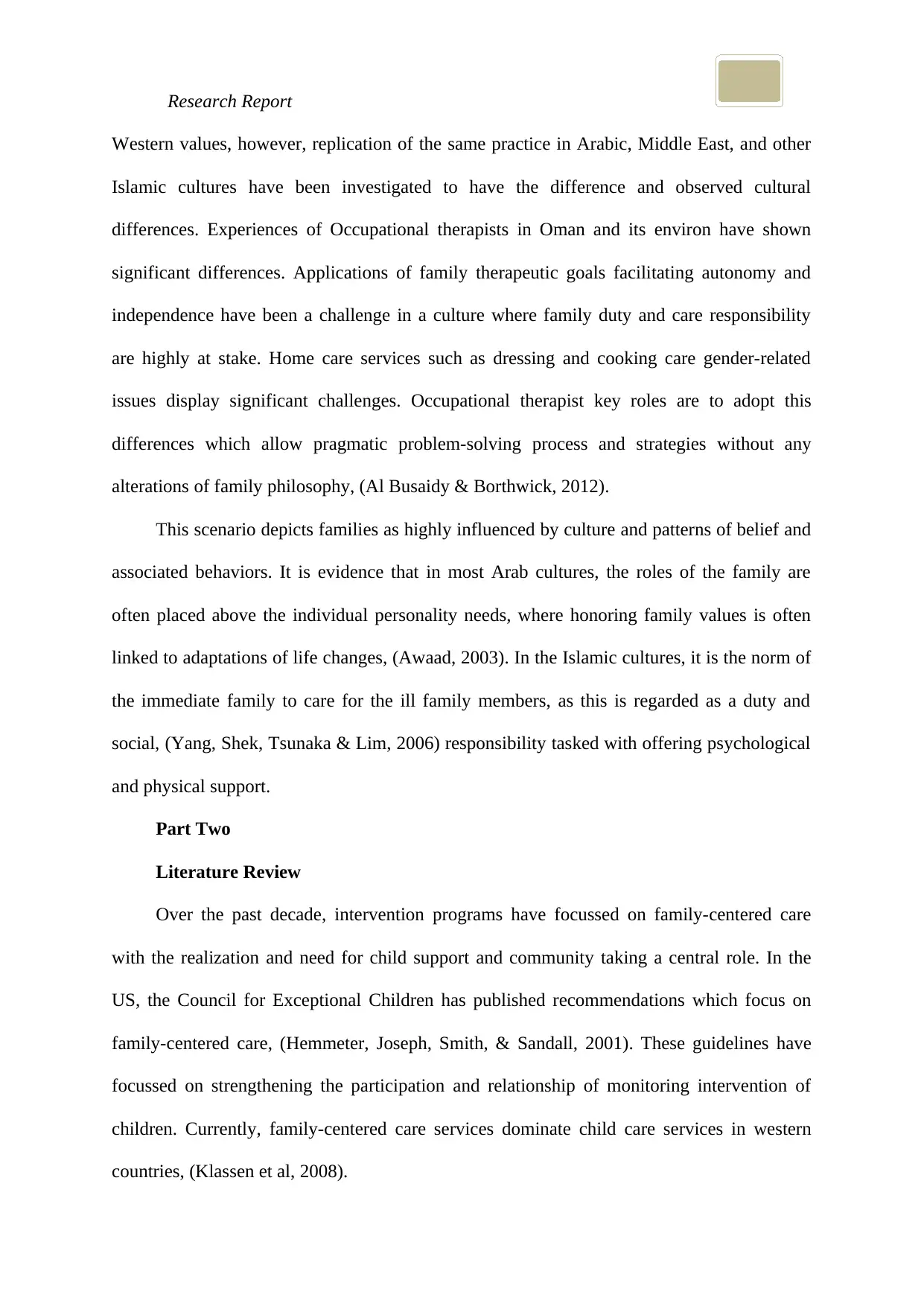
2
Research Report
Western values, however, replication of the same practice in Arabic, Middle East, and other
Islamic cultures have been investigated to have the difference and observed cultural
differences. Experiences of Occupational therapists in Oman and its environ have shown
significant differences. Applications of family therapeutic goals facilitating autonomy and
independence have been a challenge in a culture where family duty and care responsibility
are highly at stake. Home care services such as dressing and cooking care gender-related
issues display significant challenges. Occupational therapist key roles are to adopt this
differences which allow pragmatic problem-solving process and strategies without any
alterations of family philosophy, (Al Busaidy & Borthwick, 2012).
This scenario depicts families as highly influenced by culture and patterns of belief and
associated behaviors. It is evidence that in most Arab cultures, the roles of the family are
often placed above the individual personality needs, where honoring family values is often
linked to adaptations of life changes, (Awaad, 2003). In the Islamic cultures, it is the norm of
the immediate family to care for the ill family members, as this is regarded as a duty and
social, (Yang, Shek, Tsunaka & Lim, 2006) responsibility tasked with offering psychological
and physical support.
Part Two
Literature Review
Over the past decade, intervention programs have focussed on family-centered care
with the realization and need for child support and community taking a central role. In the
US, the Council for Exceptional Children has published recommendations which focus on
family-centered care, (Hemmeter, Joseph, Smith, & Sandall, 2001). These guidelines have
focussed on strengthening the participation and relationship of monitoring intervention of
children. Currently, family-centered care services dominate child care services in western
countries, (Klassen et al, 2008).
Research Report
Western values, however, replication of the same practice in Arabic, Middle East, and other
Islamic cultures have been investigated to have the difference and observed cultural
differences. Experiences of Occupational therapists in Oman and its environ have shown
significant differences. Applications of family therapeutic goals facilitating autonomy and
independence have been a challenge in a culture where family duty and care responsibility
are highly at stake. Home care services such as dressing and cooking care gender-related
issues display significant challenges. Occupational therapist key roles are to adopt this
differences which allow pragmatic problem-solving process and strategies without any
alterations of family philosophy, (Al Busaidy & Borthwick, 2012).
This scenario depicts families as highly influenced by culture and patterns of belief and
associated behaviors. It is evidence that in most Arab cultures, the roles of the family are
often placed above the individual personality needs, where honoring family values is often
linked to adaptations of life changes, (Awaad, 2003). In the Islamic cultures, it is the norm of
the immediate family to care for the ill family members, as this is regarded as a duty and
social, (Yang, Shek, Tsunaka & Lim, 2006) responsibility tasked with offering psychological
and physical support.
Part Two
Literature Review
Over the past decade, intervention programs have focussed on family-centered care
with the realization and need for child support and community taking a central role. In the
US, the Council for Exceptional Children has published recommendations which focus on
family-centered care, (Hemmeter, Joseph, Smith, & Sandall, 2001). These guidelines have
focussed on strengthening the participation and relationship of monitoring intervention of
children. Currently, family-centered care services dominate child care services in western
countries, (Klassen et al, 2008).
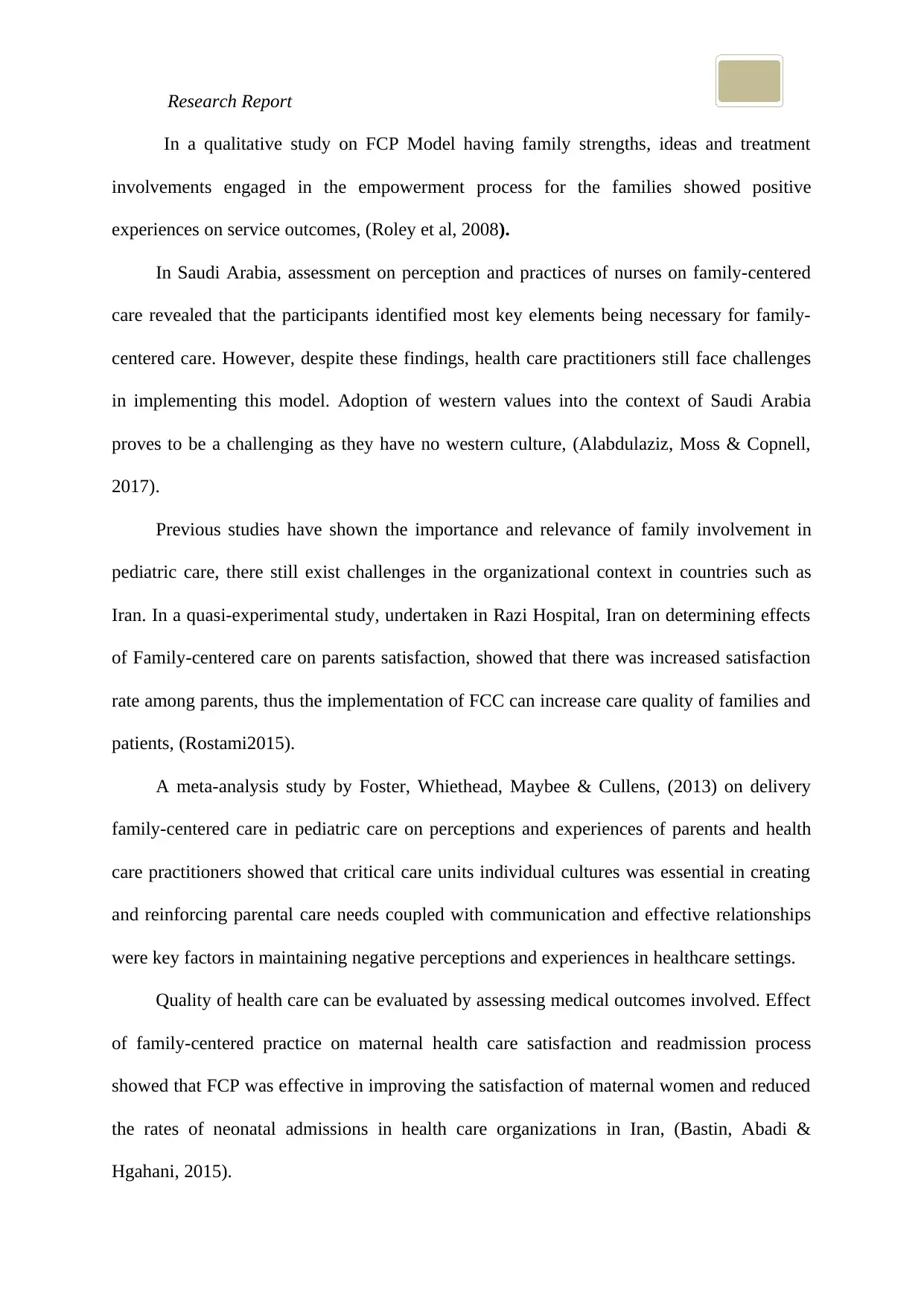
2
Research Report
In a qualitative study on FCP Model having family strengths, ideas and treatment
involvements engaged in the empowerment process for the families showed positive
experiences on service outcomes, (Roley et al, 2008).
In Saudi Arabia, assessment on perception and practices of nurses on family-centered
care revealed that the participants identified most key elements being necessary for family-
centered care. However, despite these findings, health care practitioners still face challenges
in implementing this model. Adoption of western values into the context of Saudi Arabia
proves to be a challenging as they have no western culture, (Alabdulaziz, Moss & Copnell,
2017).
Previous studies have shown the importance and relevance of family involvement in
pediatric care, there still exist challenges in the organizational context in countries such as
Iran. In a quasi-experimental study, undertaken in Razi Hospital, Iran on determining effects
of Family-centered care on parents satisfaction, showed that there was increased satisfaction
rate among parents, thus the implementation of FCC can increase care quality of families and
patients, (Rostami2015).
A meta-analysis study by Foster, Whiethead, Maybee & Cullens, (2013) on delivery
family-centered care in pediatric care on perceptions and experiences of parents and health
care practitioners showed that critical care units individual cultures was essential in creating
and reinforcing parental care needs coupled with communication and effective relationships
were key factors in maintaining negative perceptions and experiences in healthcare settings.
Quality of health care can be evaluated by assessing medical outcomes involved. Effect
of family-centered practice on maternal health care satisfaction and readmission process
showed that FCP was effective in improving the satisfaction of maternal women and reduced
the rates of neonatal admissions in health care organizations in Iran, (Bastin, Abadi &
Hgahani, 2015).
Research Report
In a qualitative study on FCP Model having family strengths, ideas and treatment
involvements engaged in the empowerment process for the families showed positive
experiences on service outcomes, (Roley et al, 2008).
In Saudi Arabia, assessment on perception and practices of nurses on family-centered
care revealed that the participants identified most key elements being necessary for family-
centered care. However, despite these findings, health care practitioners still face challenges
in implementing this model. Adoption of western values into the context of Saudi Arabia
proves to be a challenging as they have no western culture, (Alabdulaziz, Moss & Copnell,
2017).
Previous studies have shown the importance and relevance of family involvement in
pediatric care, there still exist challenges in the organizational context in countries such as
Iran. In a quasi-experimental study, undertaken in Razi Hospital, Iran on determining effects
of Family-centered care on parents satisfaction, showed that there was increased satisfaction
rate among parents, thus the implementation of FCC can increase care quality of families and
patients, (Rostami2015).
A meta-analysis study by Foster, Whiethead, Maybee & Cullens, (2013) on delivery
family-centered care in pediatric care on perceptions and experiences of parents and health
care practitioners showed that critical care units individual cultures was essential in creating
and reinforcing parental care needs coupled with communication and effective relationships
were key factors in maintaining negative perceptions and experiences in healthcare settings.
Quality of health care can be evaluated by assessing medical outcomes involved. Effect
of family-centered practice on maternal health care satisfaction and readmission process
showed that FCP was effective in improving the satisfaction of maternal women and reduced
the rates of neonatal admissions in health care organizations in Iran, (Bastin, Abadi &
Hgahani, 2015).
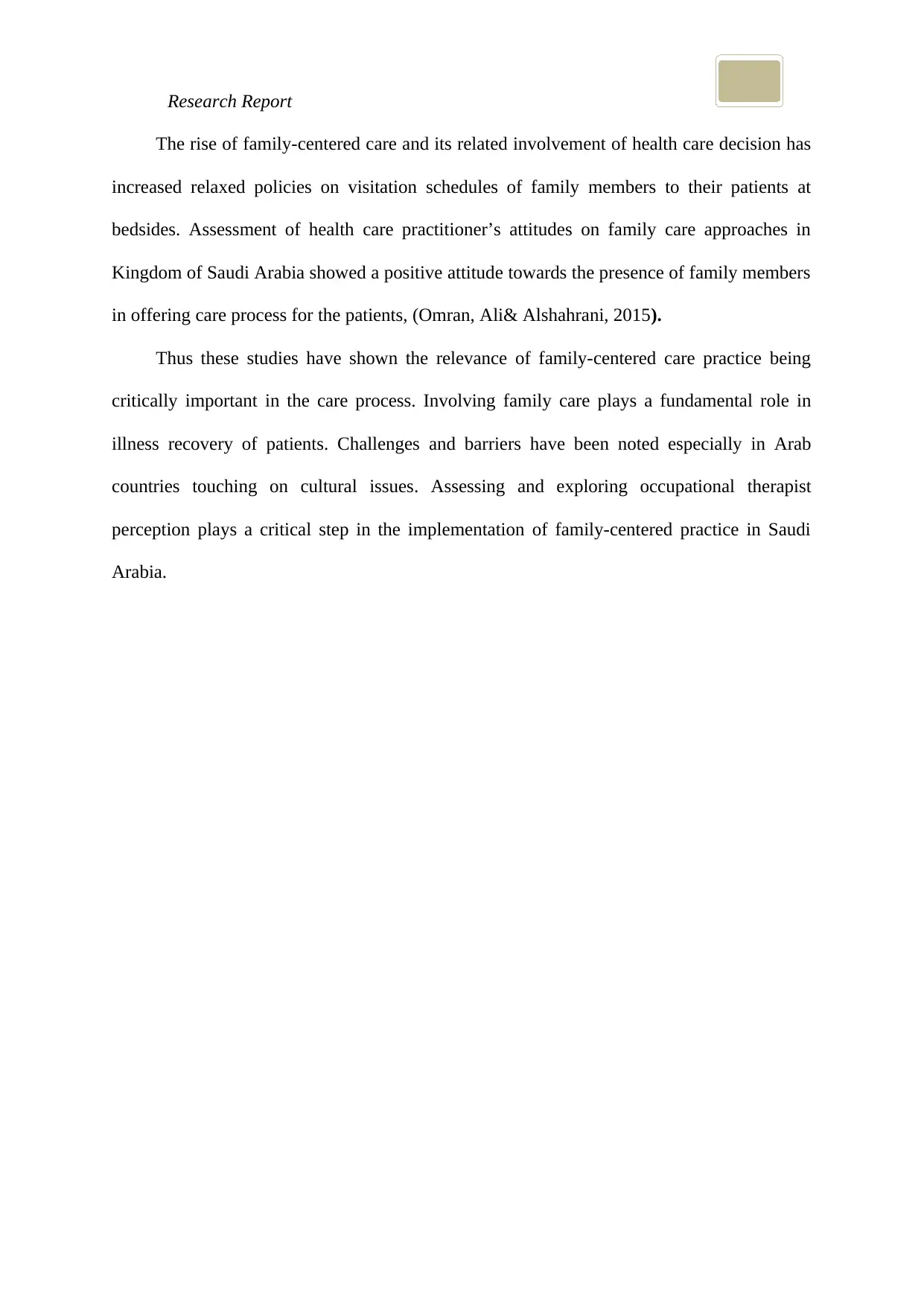
2
Research Report
The rise of family-centered care and its related involvement of health care decision has
increased relaxed policies on visitation schedules of family members to their patients at
bedsides. Assessment of health care practitioner’s attitudes on family care approaches in
Kingdom of Saudi Arabia showed a positive attitude towards the presence of family members
in offering care process for the patients, (Omran, Ali& Alshahrani, 2015).
Thus these studies have shown the relevance of family-centered care practice being
critically important in the care process. Involving family care plays a fundamental role in
illness recovery of patients. Challenges and barriers have been noted especially in Arab
countries touching on cultural issues. Assessing and exploring occupational therapist
perception plays a critical step in the implementation of family-centered practice in Saudi
Arabia.
Research Report
The rise of family-centered care and its related involvement of health care decision has
increased relaxed policies on visitation schedules of family members to their patients at
bedsides. Assessment of health care practitioner’s attitudes on family care approaches in
Kingdom of Saudi Arabia showed a positive attitude towards the presence of family members
in offering care process for the patients, (Omran, Ali& Alshahrani, 2015).
Thus these studies have shown the relevance of family-centered care practice being
critically important in the care process. Involving family care plays a fundamental role in
illness recovery of patients. Challenges and barriers have been noted especially in Arab
countries touching on cultural issues. Assessing and exploring occupational therapist
perception plays a critical step in the implementation of family-centered practice in Saudi
Arabia.
Paraphrase This Document
Need a fresh take? Get an instant paraphrase of this document with our AI Paraphraser
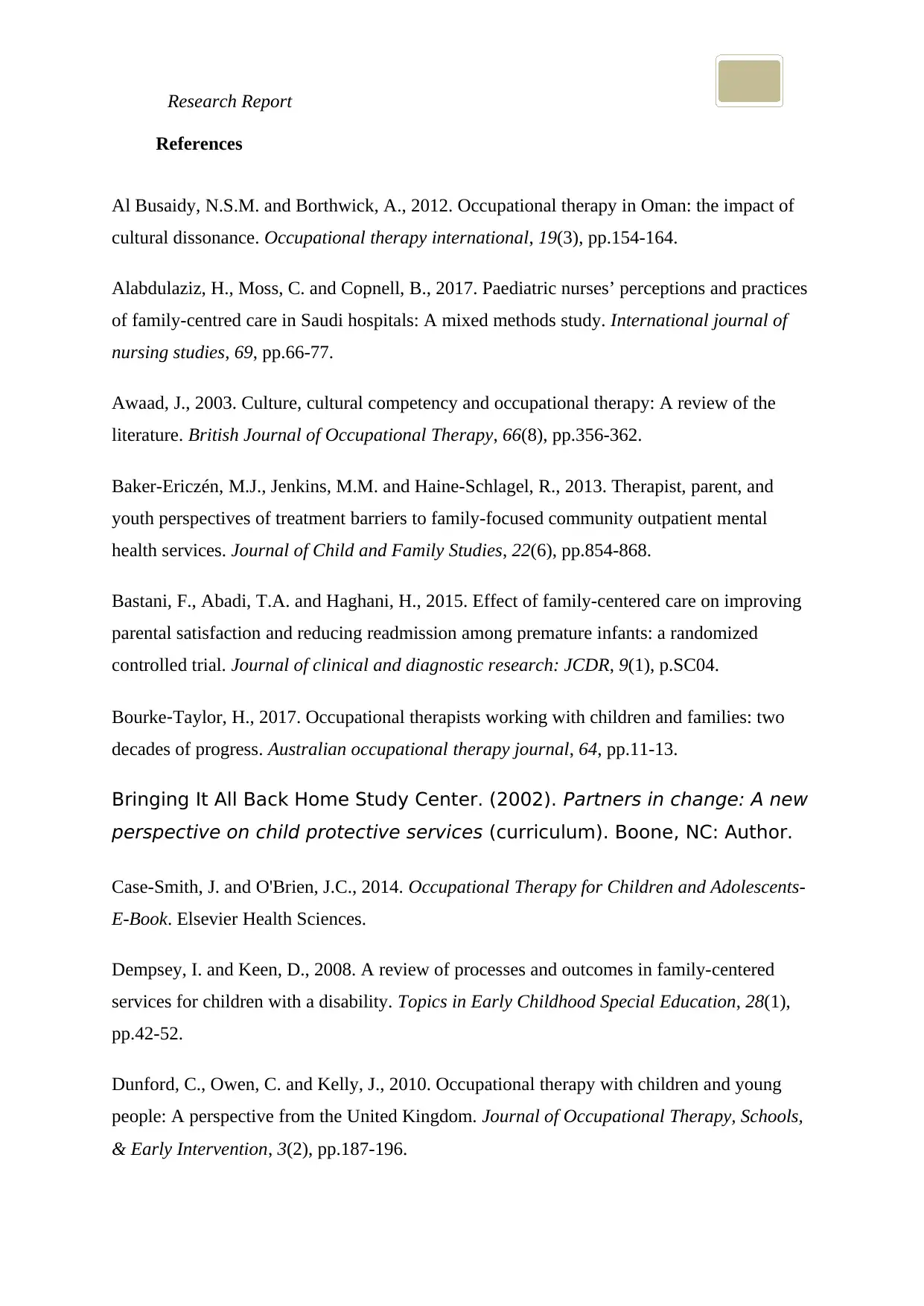
2
Research Report
References
Al Busaidy, N.S.M. and Borthwick, A., 2012. Occupational therapy in Oman: the impact of
cultural dissonance. Occupational therapy international, 19(3), pp.154-164.
Alabdulaziz, H., Moss, C. and Copnell, B., 2017. Paediatric nurses’ perceptions and practices
of family-centred care in Saudi hospitals: A mixed methods study. International journal of
nursing studies, 69, pp.66-77.
Awaad, J., 2003. Culture, cultural competency and occupational therapy: A review of the
literature. British Journal of Occupational Therapy, 66(8), pp.356-362.
Baker-Ericzén, M.J., Jenkins, M.M. and Haine-Schlagel, R., 2013. Therapist, parent, and
youth perspectives of treatment barriers to family-focused community outpatient mental
health services. Journal of Child and Family Studies, 22(6), pp.854-868.
Bastani, F., Abadi, T.A. and Haghani, H., 2015. Effect of family-centered care on improving
parental satisfaction and reducing readmission among premature infants: a randomized
controlled trial. Journal of clinical and diagnostic research: JCDR, 9(1), p.SC04.
Bourke‐Taylor, H., 2017. Occupational therapists working with children and families: two
decades of progress. Australian occupational therapy journal, 64, pp.11-13.
Bringing It All Back Home Study Center. (2002). Partners in change: A new
perspective on child protective services (curriculum). Boone, NC: Author.
Case-Smith, J. and O'Brien, J.C., 2014. Occupational Therapy for Children and Adolescents-
E-Book. Elsevier Health Sciences.
Dempsey, I. and Keen, D., 2008. A review of processes and outcomes in family-centered
services for children with a disability. Topics in Early Childhood Special Education, 28(1),
pp.42-52.
Dunford, C., Owen, C. and Kelly, J., 2010. Occupational therapy with children and young
people: A perspective from the United Kingdom. Journal of Occupational Therapy, Schools,
& Early Intervention, 3(2), pp.187-196.
Research Report
References
Al Busaidy, N.S.M. and Borthwick, A., 2012. Occupational therapy in Oman: the impact of
cultural dissonance. Occupational therapy international, 19(3), pp.154-164.
Alabdulaziz, H., Moss, C. and Copnell, B., 2017. Paediatric nurses’ perceptions and practices
of family-centred care in Saudi hospitals: A mixed methods study. International journal of
nursing studies, 69, pp.66-77.
Awaad, J., 2003. Culture, cultural competency and occupational therapy: A review of the
literature. British Journal of Occupational Therapy, 66(8), pp.356-362.
Baker-Ericzén, M.J., Jenkins, M.M. and Haine-Schlagel, R., 2013. Therapist, parent, and
youth perspectives of treatment barriers to family-focused community outpatient mental
health services. Journal of Child and Family Studies, 22(6), pp.854-868.
Bastani, F., Abadi, T.A. and Haghani, H., 2015. Effect of family-centered care on improving
parental satisfaction and reducing readmission among premature infants: a randomized
controlled trial. Journal of clinical and diagnostic research: JCDR, 9(1), p.SC04.
Bourke‐Taylor, H., 2017. Occupational therapists working with children and families: two
decades of progress. Australian occupational therapy journal, 64, pp.11-13.
Bringing It All Back Home Study Center. (2002). Partners in change: A new
perspective on child protective services (curriculum). Boone, NC: Author.
Case-Smith, J. and O'Brien, J.C., 2014. Occupational Therapy for Children and Adolescents-
E-Book. Elsevier Health Sciences.
Dempsey, I. and Keen, D., 2008. A review of processes and outcomes in family-centered
services for children with a disability. Topics in Early Childhood Special Education, 28(1),
pp.42-52.
Dunford, C., Owen, C. and Kelly, J., 2010. Occupational therapy with children and young
people: A perspective from the United Kingdom. Journal of Occupational Therapy, Schools,
& Early Intervention, 3(2), pp.187-196.
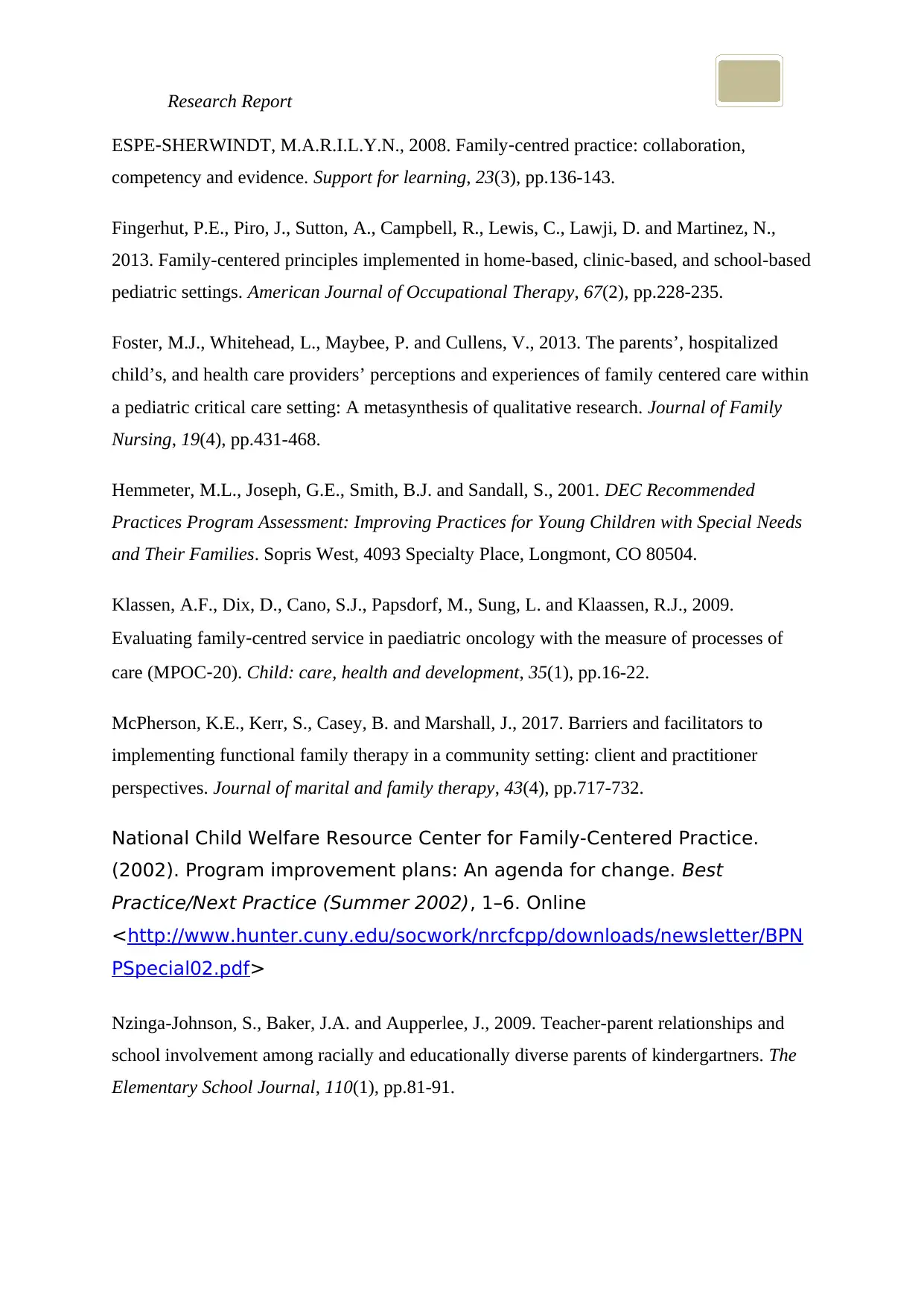
2
Research Report
ESPE‐SHERWINDT, M.A.R.I.L.Y.N., 2008. Family‐centred practice: collaboration,
competency and evidence. Support for learning, 23(3), pp.136-143.
Fingerhut, P.E., Piro, J., Sutton, A., Campbell, R., Lewis, C., Lawji, D. and Martinez, N.,
2013. Family-centered principles implemented in home-based, clinic-based, and school-based
pediatric settings. American Journal of Occupational Therapy, 67(2), pp.228-235.
Foster, M.J., Whitehead, L., Maybee, P. and Cullens, V., 2013. The parents’, hospitalized
child’s, and health care providers’ perceptions and experiences of family centered care within
a pediatric critical care setting: A metasynthesis of qualitative research. Journal of Family
Nursing, 19(4), pp.431-468.
Hemmeter, M.L., Joseph, G.E., Smith, B.J. and Sandall, S., 2001. DEC Recommended
Practices Program Assessment: Improving Practices for Young Children with Special Needs
and Their Families. Sopris West, 4093 Specialty Place, Longmont, CO 80504.
Klassen, A.F., Dix, D., Cano, S.J., Papsdorf, M., Sung, L. and Klaassen, R.J., 2009.
Evaluating family‐centred service in paediatric oncology with the measure of processes of
care (MPOC‐20). Child: care, health and development, 35(1), pp.16-22.
McPherson, K.E., Kerr, S., Casey, B. and Marshall, J., 2017. Barriers and facilitators to
implementing functional family therapy in a community setting: client and practitioner
perspectives. Journal of marital and family therapy, 43(4), pp.717-732.
National Child Welfare Resource Center for Family-Centered Practice.
(2002). Program improvement plans: An agenda for change. Best
Practice/Next Practice (Summer 2002), 1–6. Online
<http://www.hunter.cuny.edu/socwork/nrcfcpp/downloads/newsletter/BPN
PSpecial02.pdf>
Nzinga-Johnson, S., Baker, J.A. and Aupperlee, J., 2009. Teacher-parent relationships and
school involvement among racially and educationally diverse parents of kindergartners. The
Elementary School Journal, 110(1), pp.81-91.
Research Report
ESPE‐SHERWINDT, M.A.R.I.L.Y.N., 2008. Family‐centred practice: collaboration,
competency and evidence. Support for learning, 23(3), pp.136-143.
Fingerhut, P.E., Piro, J., Sutton, A., Campbell, R., Lewis, C., Lawji, D. and Martinez, N.,
2013. Family-centered principles implemented in home-based, clinic-based, and school-based
pediatric settings. American Journal of Occupational Therapy, 67(2), pp.228-235.
Foster, M.J., Whitehead, L., Maybee, P. and Cullens, V., 2013. The parents’, hospitalized
child’s, and health care providers’ perceptions and experiences of family centered care within
a pediatric critical care setting: A metasynthesis of qualitative research. Journal of Family
Nursing, 19(4), pp.431-468.
Hemmeter, M.L., Joseph, G.E., Smith, B.J. and Sandall, S., 2001. DEC Recommended
Practices Program Assessment: Improving Practices for Young Children with Special Needs
and Their Families. Sopris West, 4093 Specialty Place, Longmont, CO 80504.
Klassen, A.F., Dix, D., Cano, S.J., Papsdorf, M., Sung, L. and Klaassen, R.J., 2009.
Evaluating family‐centred service in paediatric oncology with the measure of processes of
care (MPOC‐20). Child: care, health and development, 35(1), pp.16-22.
McPherson, K.E., Kerr, S., Casey, B. and Marshall, J., 2017. Barriers and facilitators to
implementing functional family therapy in a community setting: client and practitioner
perspectives. Journal of marital and family therapy, 43(4), pp.717-732.
National Child Welfare Resource Center for Family-Centered Practice.
(2002). Program improvement plans: An agenda for change. Best
Practice/Next Practice (Summer 2002), 1–6. Online
<http://www.hunter.cuny.edu/socwork/nrcfcpp/downloads/newsletter/BPN
PSpecial02.pdf>
Nzinga-Johnson, S., Baker, J.A. and Aupperlee, J., 2009. Teacher-parent relationships and
school involvement among racially and educationally diverse parents of kindergartners. The
Elementary School Journal, 110(1), pp.81-91.
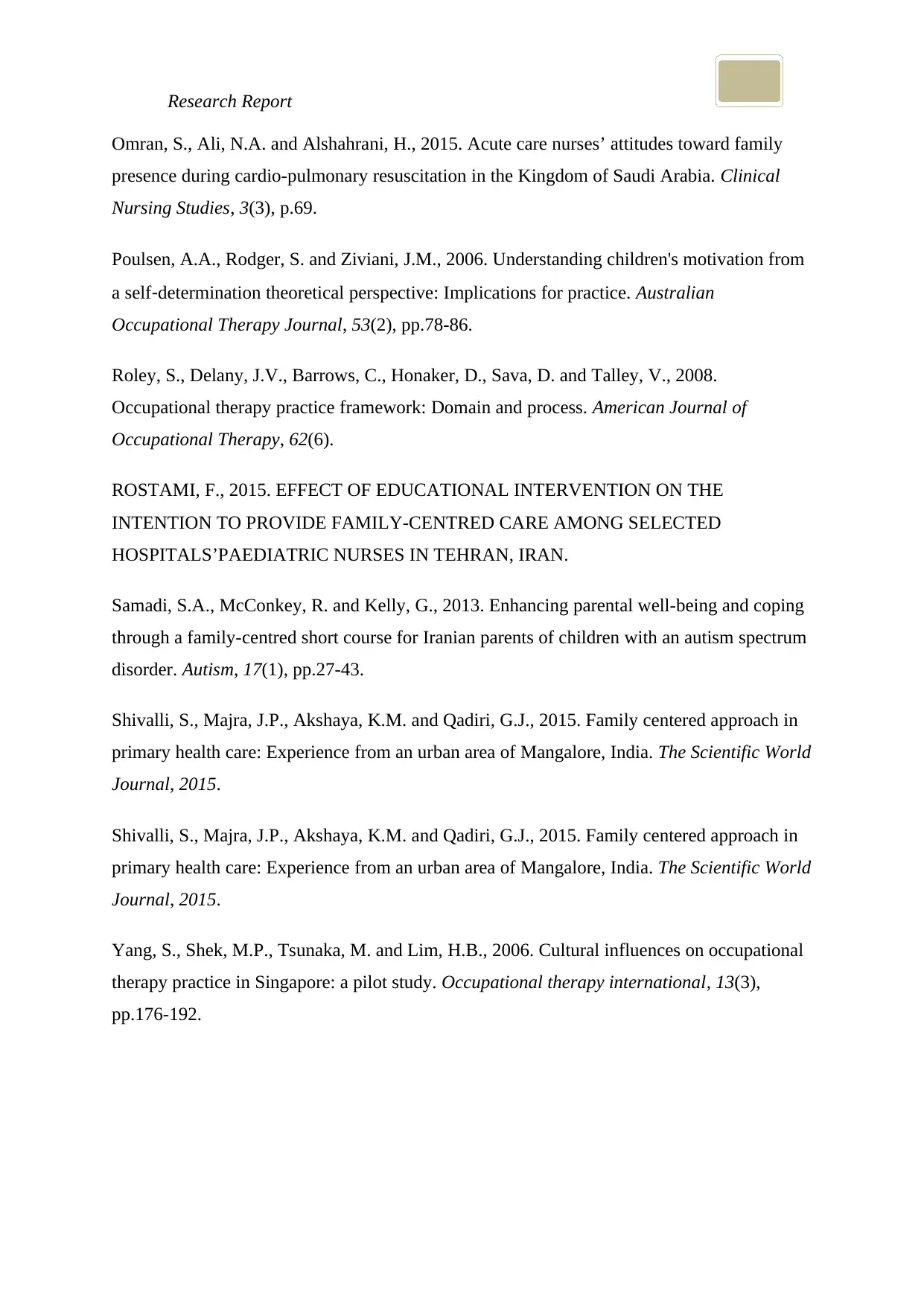
2
Research Report
Omran, S., Ali, N.A. and Alshahrani, H., 2015. Acute care nurses’ attitudes toward family
presence during cardio-pulmonary resuscitation in the Kingdom of Saudi Arabia. Clinical
Nursing Studies, 3(3), p.69.
Poulsen, A.A., Rodger, S. and Ziviani, J.M., 2006. Understanding children's motivation from
a self‐determination theoretical perspective: Implications for practice. Australian
Occupational Therapy Journal, 53(2), pp.78-86.
Roley, S., Delany, J.V., Barrows, C., Honaker, D., Sava, D. and Talley, V., 2008.
Occupational therapy practice framework: Domain and process. American Journal of
Occupational Therapy, 62(6).
ROSTAMI, F., 2015. EFFECT OF EDUCATIONAL INTERVENTION ON THE
INTENTION TO PROVIDE FAMILY-CENTRED CARE AMONG SELECTED
HOSPITALS’PAEDIATRIC NURSES IN TEHRAN, IRAN.
Samadi, S.A., McConkey, R. and Kelly, G., 2013. Enhancing parental well-being and coping
through a family-centred short course for Iranian parents of children with an autism spectrum
disorder. Autism, 17(1), pp.27-43.
Shivalli, S., Majra, J.P., Akshaya, K.M. and Qadiri, G.J., 2015. Family centered approach in
primary health care: Experience from an urban area of Mangalore, India. The Scientific World
Journal, 2015.
Shivalli, S., Majra, J.P., Akshaya, K.M. and Qadiri, G.J., 2015. Family centered approach in
primary health care: Experience from an urban area of Mangalore, India. The Scientific World
Journal, 2015.
Yang, S., Shek, M.P., Tsunaka, M. and Lim, H.B., 2006. Cultural influences on occupational
therapy practice in Singapore: a pilot study. Occupational therapy international, 13(3),
pp.176-192.
Research Report
Omran, S., Ali, N.A. and Alshahrani, H., 2015. Acute care nurses’ attitudes toward family
presence during cardio-pulmonary resuscitation in the Kingdom of Saudi Arabia. Clinical
Nursing Studies, 3(3), p.69.
Poulsen, A.A., Rodger, S. and Ziviani, J.M., 2006. Understanding children's motivation from
a self‐determination theoretical perspective: Implications for practice. Australian
Occupational Therapy Journal, 53(2), pp.78-86.
Roley, S., Delany, J.V., Barrows, C., Honaker, D., Sava, D. and Talley, V., 2008.
Occupational therapy practice framework: Domain and process. American Journal of
Occupational Therapy, 62(6).
ROSTAMI, F., 2015. EFFECT OF EDUCATIONAL INTERVENTION ON THE
INTENTION TO PROVIDE FAMILY-CENTRED CARE AMONG SELECTED
HOSPITALS’PAEDIATRIC NURSES IN TEHRAN, IRAN.
Samadi, S.A., McConkey, R. and Kelly, G., 2013. Enhancing parental well-being and coping
through a family-centred short course for Iranian parents of children with an autism spectrum
disorder. Autism, 17(1), pp.27-43.
Shivalli, S., Majra, J.P., Akshaya, K.M. and Qadiri, G.J., 2015. Family centered approach in
primary health care: Experience from an urban area of Mangalore, India. The Scientific World
Journal, 2015.
Shivalli, S., Majra, J.P., Akshaya, K.M. and Qadiri, G.J., 2015. Family centered approach in
primary health care: Experience from an urban area of Mangalore, India. The Scientific World
Journal, 2015.
Yang, S., Shek, M.P., Tsunaka, M. and Lim, H.B., 2006. Cultural influences on occupational
therapy practice in Singapore: a pilot study. Occupational therapy international, 13(3),
pp.176-192.
1 out of 10
Related Documents
Your All-in-One AI-Powered Toolkit for Academic Success.
+13062052269
info@desklib.com
Available 24*7 on WhatsApp / Email
![[object Object]](/_next/static/media/star-bottom.7253800d.svg)
Unlock your academic potential
© 2024 | Zucol Services PVT LTD | All rights reserved.





